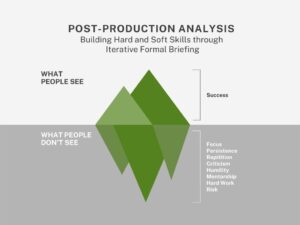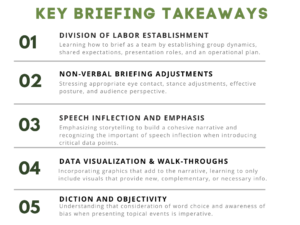
In a recent podcast, retired U.S. Navy SEAL Jocko Willink highlights the importance of making mistakes as a critical facet of professional growth. During his motivational speech, Jocko details a list of concerns posed by his direct subordinates in the joint services, whereby he frames failure as a necessary point of reflection and self-improvement. Throughout the video, Jocko’s message remains clear: when something goes wrong, there will always be good that comes from it, even amid negativity or regret. Whether a result of injury, misguidance, or unexpected problems, failure simply provides the opportunity to find a solution. Starting with Jocko’s mantra as a springboard, Research Analyst, Benjamin McCrickard, will detail how the Intelligence Cell has embraced its own analytic shortfalls, uncertainty, and challenges as an opportunity for growth in formal briefing.
Building Credibility via Constructive Criticism and Iteration
For the past two months, Praescient’s Intel Cell has collected, exploited, and critically analyzed publicly available information toward weekly situational reports surrounding the ongoing Russo-Ukraine conflict. Paramount to the relevance of such findings was the iterative process of briefing actionable intelligence findings and integrating constructive feedback from senior analysts within the company. During their weekly post-production analysis phase, Research Analysts engaged in deliberate self-assessments and editorial processes to weed out unconscious cognitive biases and erroneous analytic assumptions in the next brief. By conducting red team analysis, the Intel Cell triaged evolving crises with immense care and countervailing evidence to ensure consistency with Praescient’s business priorities and intelligence requirements. At the end of the six weeks, Praescient’s Research Analysts had honed their analytic tradecraft to effectively integrate subject expertise and constructive feedback into a polished and actionable intelligence portfolio.

Beyond developing a broad analytic skill set, Intelligence Cell Research Analysts honed a range of critical soft skills that supplemented their analysis and formal briefing techniques. Particularly during the first two briefing cycles, all members of the team were forced to challenge and confront their long-standing uneasiness with public speaking. This iterative briefing process enabled junior Research Analysts to professionalize their skillsets, without fear of judgment or reprimand. Having collectively spent weeks with the sourcing material, this semi-structured environment provided the Intel Cell with the freedom to fail and the opportunity to foster new creative solutions or otherwise adapt old ones. Briefing as a team enabled members of the Intelligence Cell to empower one another week to week, such that each demonstrated persistence, humility, comfortability amid confusion, and a commitment to learning from every obstacle. This sense of comradery and mutual support grew exponentially over the six-week period. It not only enabled the Intel Cell to develop both hard and soft skills but culminated their analysis into a polished intelligence product that informed time-sensitive decision-making at every level of the organization.

Praescient’s Iterative Learning Model and Integrated Training Platform
Since its inception, Praescient Analytics has demonstrated a commitment to supporting a diverse range of public-private mission sets across the national security space. Praescient’s Research Analysts have always taken the initiative to apply both hard and soft skills toward finding a solution, independent of the scale and nature of the problem at hand. They continue to express creativity and take great risks on a weekly basis, particularly in identifying critical knowledge gaps, building confidence, seizing opportunities, and making unrealized connections across disparate data sources. From this perspective, developing a holistic understanding of the global threat landscape encompasses only a piece of the intelligence cycle. Analysts must garner insight from colleagues’ unique perspectives and seek to present a succinct, consistent narrative across their analytic products. Doing so requires a high degree of patience and foresight in conveying the right message at precisely the right time to drive decision-making at all levels of governance.
Many of the Intelligence Cell’s analytic and operational successes stem from Praescient’s iterative model of professional development. This push-pull between structured and unstructured learning allows analysts to maintain flexibility in applying their creative foresight and analytic minds, without constraining their approach or end product. For those seeking to learn similar skills or develop an integrated analytic toolkit, Team Praescient highly recommends checking out its new Praescient Learning Platform (PLP), which launched in January 2022. This self-paced training program for i2 Analyst’s Notebook is accessible, modular, interactive, and applicable across a wide range of analytic workflows. It mirrors Team Praescient’s iterative learning model by providing analysts with interactive lessons to test skills, learn from mistakes, and answer critical research questions from a better-informed and well-equipped position.